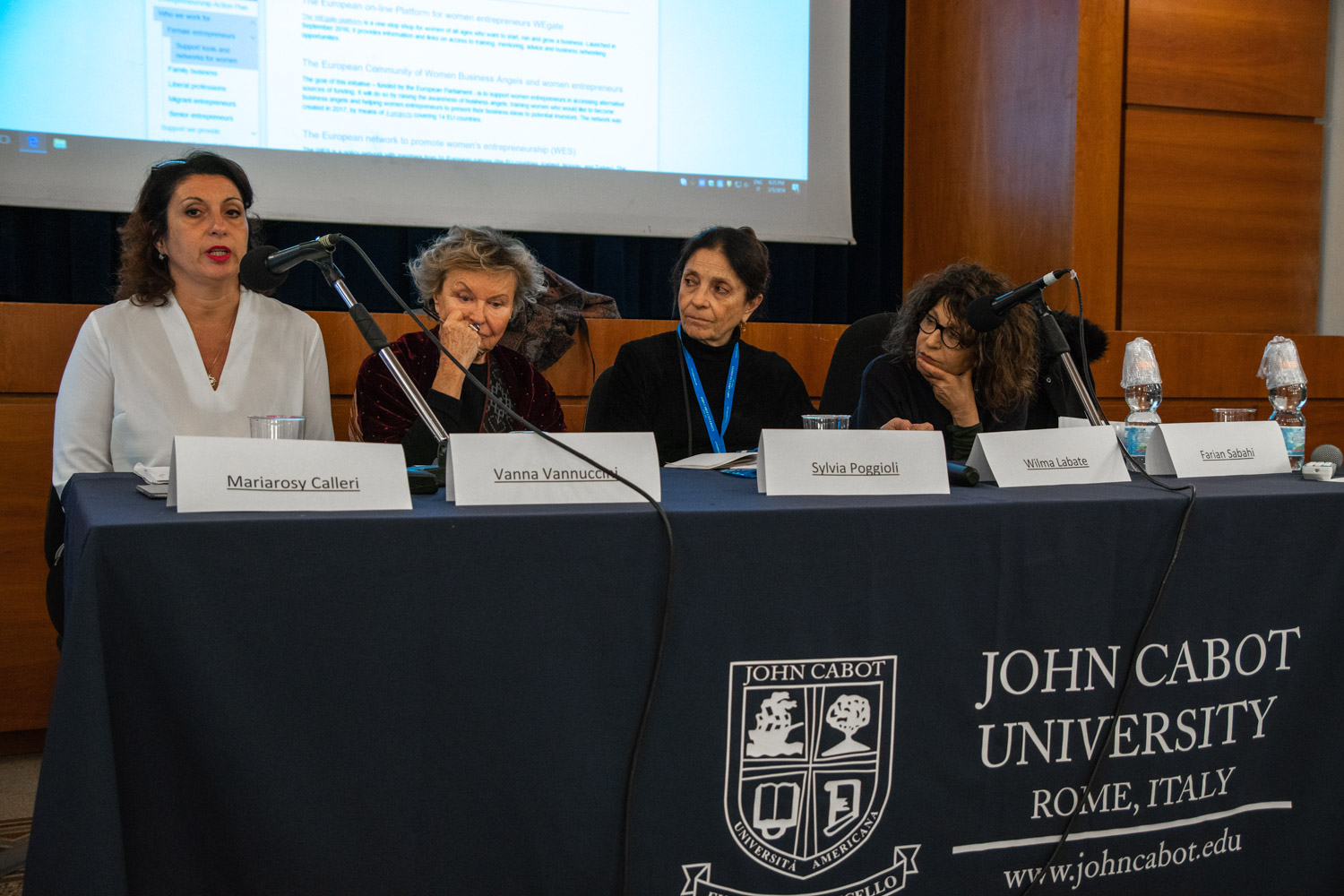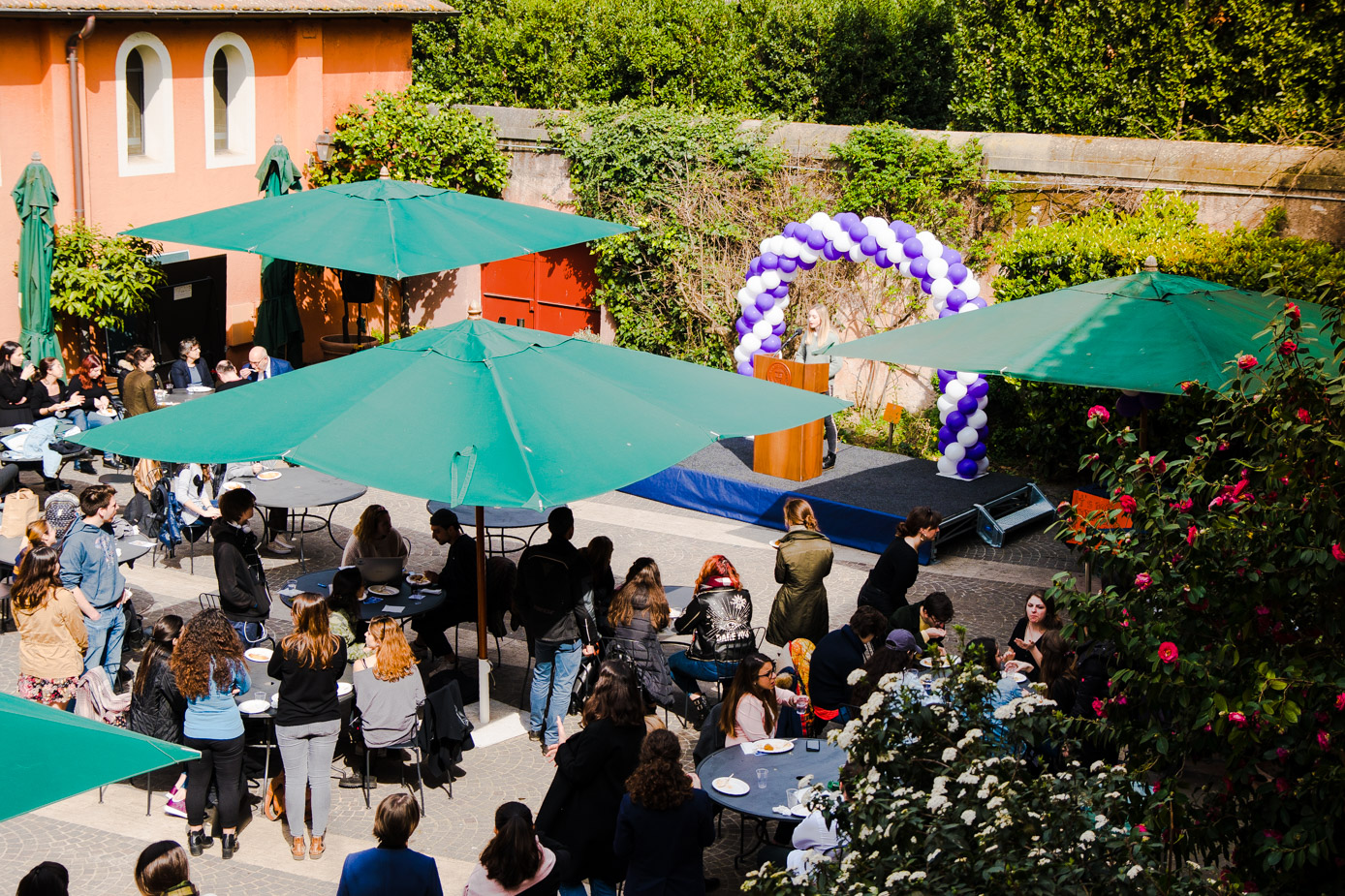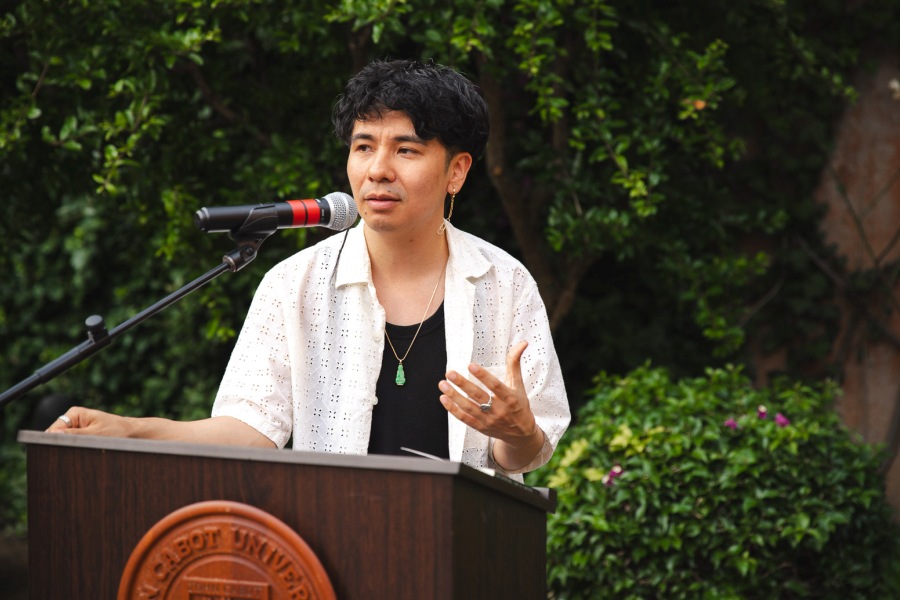John Cabot University Celebrates International Women's Day
JCU’s Student Activities Board and the Women’s Leadership Initiative (WLI) hosted a week-long series of events for International Women’s Day, to celebrate the economic, political, and social achievements of women and discuss the numerous challenges that women face.
The Week’s opening panel discussion was “Women Through the Ages: Looking Back, Moving Forward” held in Aula Magna, with Prof. Tara Keenan as moderator. Guest speakers were Mariarosy Calleri, Wilma Labate, Sylvia Poggioli, Farian Sabahi, and Vanna Vannuccini.

Women Through the Ages Panel Discussion
Italian screenwriter, director, and producer Mariarosy Calleri talked about her experience as a first-generation entrepreneur in Italy. Despite working for years in New York City and receiving acclaim there, it was hard for her to make a name for herself in her home country. She decided to found her own company, Marden Entertainment production company and now she’s an ambassador for women entrepreneurs at the EU.
Wilma Labate, another experienced Italian filmmaker, started her work as a director in the 90s after working as an assistant for many renowned directors. One day she was called by RAI, the national public broadcasting company of Italy, to make a documentary about animal vivisection that nobody else wanted to make. She turned this opportunity around and instead made a completely different film where she talked about the equally shocking (for the time) topic of birth control. In her talk, she denounced the unbalanced ratio of male/female directors, with “only 4% female directors in the world and still significantly underpaid.” According to Labate, female directors, like all women, put their entire selves into their endeavors and are always honest and spontaneous. This is not a weakness but a strength that women must learn to count on.
Next on the panel was American journalist Sylvia Poggioli, the Senior European Correspondent for National Public Radio. In the words of moderator Prof. Tara Keenan, “there isn’t an award she has not won.” She gave a brief history of feminism in Italy and why the #MeToo movement was not as well received here as in other countries. She blamed much of the current sexism in Italy to the way in which the objectification of women’s bodies is normalized on television, and she encouraged the audience to watch Lorella Zanardo’s “Il Corpo delle Donne,” a short film about this cultural and social phenomenon. Poggioli also described being present at the first ever March 8th celebration in Rome held in Campo dei Fiori in 1972; Jane Fonda happened to be there for a film premiere and the journalists took radiant photos of the actress while other women were being beaten by the authorities for protesting for their rights.
JCU Lecturer in Politics and Religion and author of the book We, The Women of Tehran, Farian Sabahi mentioned her TedxTalk “Letter to Pope Francis” about the true story of a woman who is abused by a husband who is continually absolved by the local priest. Prof. Sabahi has spent much time working in Iran and in Yemen and witnessed the unfair conditions that most women live in. “The law is incredibly sexist in Iran, women can only inherit 50% of property and a woman’s testimony in court is worth less than a man’s,” Sabahi said. “Yemen is the country of child brides, high fertility and low literacy.” On the other hand, she also reported a significant increase in female education in Iran (3/4 freshmen at university are females, especially in STEM subjects).
Vanna Vannuccini, writer, journalist for La Repubblica, and founder of Effe, one of the first Italian feminist magazines, is also an expert on the condition of women in Iran. She seconded Sabahi’s statements and then talked about the ebb and flow of social justice in Iran: the fight for women’s rights starts and ends continually, some battles are won, some rights are achieved and then lost a few years later. She admitted that lately, she has seen a more favorable environment for young women in big cities.
On March 7th, the Institute for Entrepreneurship organized the screening of the movie Soufra. The documentary follows the life of a Lebanese woman, Mariam AlShaar, who manages to successfully launch a catering company, in the Burj El Barajneh refugee camp just south of Beirut, Lebanon with the financial help of the Alfanar philanthropy organization. At first, the women started catering for school lunches and later expanded to catering private parties, until, against all odds, these women open the first food truck business in a refugee camp.
The movie portrays Miriam as the symbol of hope, empowerment, and commitment. It emphasizes the importance of coming together, through food, at the same time overcoming cultural barriers. Through her business, Miriam unites women from Syria, Iraq, Palestine, and Lebanon, who by working together and believing in themselves and in Miriam’s initiative, become an inspiration for women worldwide.
Other events included a roundtable on “Women in Academia,” a photo exhibit celebrating JCU’s female faculty and staff, and a “Parenting Isn’t Just for Women” luncheon, moderated by Director of Student Services Pilar Murguia.
Friday, March 8th was the culmination of Women’s Week, with the annual International Women’s Day of Action Celebration in the Lemon Tree Courtyard, organized by the Women’s Leadership Initiative (WLI) and the members of the Student Activities Board (SAB). A multiethnic lunch was catered by the refugee organization Gustamundo and provided by Staff Council. About 130 students participated in the event, joined by dozens of faculty and staff members who all came together as one to celebrate the recurring tradition.

Women’s Day
The JCU community collected powerful quotes by and about women in the weeks leading up to Women’s Week, and the quotes were made available to those attending the celebration via a QR code that everyone could easily scan on their phone. It was the first event for which JCU produced only e-pamphlets in order to reduce paper waste and help the environment. Students, staff, and faculty volunteered to read the quotes, share stories or poems. President Pavoncello spoke about how women are succeeding in academia, particularly in STEM fields.
Maggie Vlaj, Vice-President of WLI talked about why she defines herself as a feminist and said, “To all of you who believe in gender equality but might be afraid to call yourself the f-word (feminist), don’t be. You’re powerful, and you can make a difference.”
Later in the day, WLI invited the community to join the Rome Women’s March to bring attention to issues of gender discrimination in Italy’s current social and political climate. The march counted several thousands of people and received attention from the Italian and international press.





